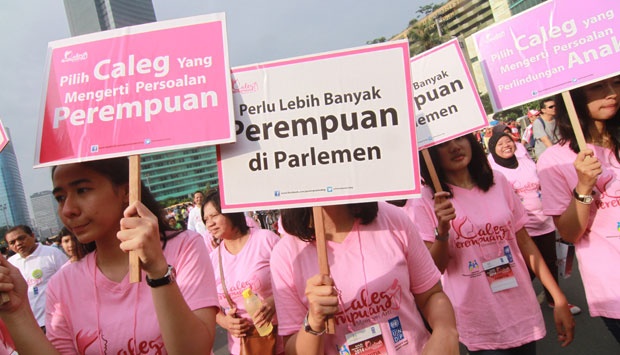IDNAround – The General Elections Commission’s (KPU) Regulation No. 10/2023 regarding the nomination of members of the House of Representatives (DPR), Provincial Representatives Council, and Regency/City Representatives Council drew protests from the women’s movement activists and election monitoring organizations. The catalyst was Article 8 Clause 2 which stipulates rounding off the total number of prospective female legislative candidates of each constituency resulting in lower representation of women in the 2024 general elections.
Law No. 7/2017 on General Elections says that at least 30 percent of the legislative candidate list should be women. The new KPU regulation states that if the female quota calculation results in a fractional number, the two decimals should be rounded down if it is less than 50 and rounded up if it is 50 or more. For instance, if the total number is four, then 30 percent of it is 1.2 which should be rounded down to one.
An activist with Masyarakat Peduli Keterwakilan Perempuan, a women’s representation advocacy community, Valentina Sagala, feels that the new KPU regulation will hinder the realization of the 30 percent representation. “We must not take it easy,” she told the reporters early this month.
Protests from the women’s movement and election activists almost compelled the KPU to revise the regulation and the commission conveyed this intention during a press conference on May 10. However, it changed its mind after a hearing with the DPR on May 17.
When their protests went unheeded, Masyarakat Peduli Keterwakilan Perempuan filed a petition for a judicial review of the regulation at the Supreme Court on June 5. Valentina, the founder of the Women’s Institute, said, “Clause 2 of Article 8 contradicts the 1945 Constitution, the General Election Law, and the Law No. 7/1984 regarding ratification of CEDAW (Convention on the Elimination of All Forms of Discrimination Against Women).”
How crucial is the impact of this new KPU regulation?
The women’s movement was behind the push for reform and one of the implications is the amendments of the 1945 Constitution, one of which is Article 28 H Clause 2 which says that everyone has the right to ease and special treatment to receive equal opportunities and benefits. Laypersons interpret this article as affirmative action.
One of the well-known legal instruments of the United Nations for human rights matters is the Convention on the Elimination of All Forms of Discrimination against Women which Indonesia has ratified through Law No. 7/1994. CEDAW obligates its members including Indonesia to ascertain that there is no discrimination against women and to strive for gender equality in various fields including politics. That is what the women’s movement is fighting for in the Election Law to ensure 30 percent representation of women.
Where did the number come from?
There were several options when the Election Law was drafted (2004). The highest quota for women candidates was 50 percent. Then it became 30 percent but under a system more suitable for the law. So, (the stipulation) is not in the KPU regulation because we chose 30 percent from the options of 20 percent to 50 percent. Ideally, it should be 50 percent because the total female population is 50 percent.
What is the impact of the KPU regulation?
Mathematically, constituencies with total legislative candidates of 4, 7, 8, and 11 will have problems. A constituency with four candidates, for example, will have 1.2 female candidates. Then it will come to only one candidate (after rounding down). Consequently, (the total number of female candidates) will be less than 30 percent. In a hearing (with the DPR and KPU on May 17), the DPR assured that there wouldn’t be any problem (with the regulation) because nationally the total number would still be 30 percent. In Article 245 of Law No. 7 /2017 on General Election, the 30 percent mandate is for each electoral district, not for the national total.
Related News: Police Aim to Immediately Destroy Confiscated Drugs to Avoid Misuse

